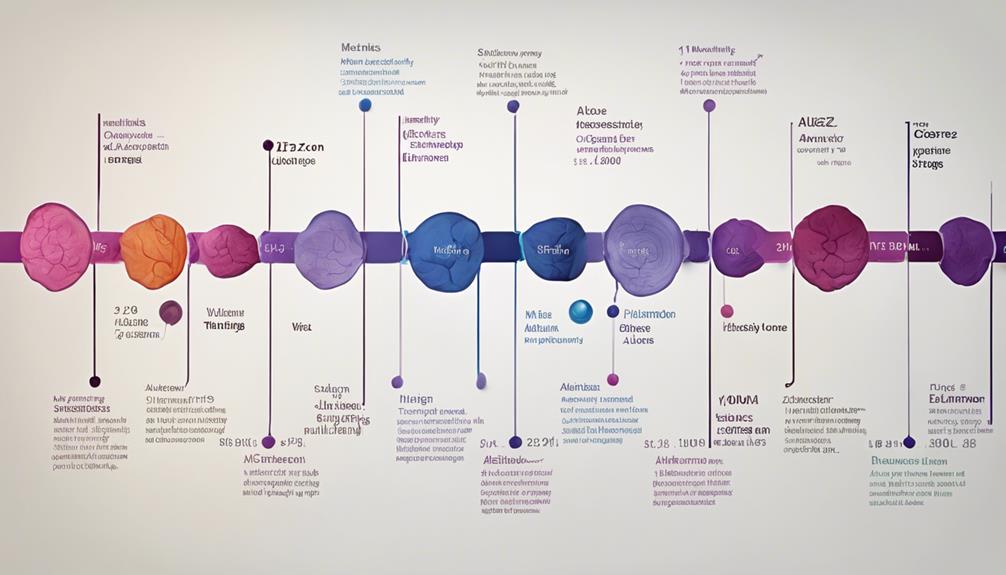When caring for individuals with Alzheimer’s, it is commonly emphasized that having patience is essential. Having empathy and providing personalized attention are crucial in understanding their specific needs. By acknowledging their retained abilities and placing importance on their overall health, caregivers can provide assistance that encourages dignity and independence.
However, navigating the complexities of Alzheimer's care goes beyond surface-level understanding. Stay tuned to explore practical strategies, communication techniques, and self-care tips that can make a significant difference in the lives of both patients and their caregivers.
Key Takeaways
- Personalized care tailored to emotional needs fosters identity and belonging.
- Empathy crucial to understanding unique challenges and experiences.
- Acknowledging feelings improves Alzheimer's patients' quality of life.
- Tailored care focusing on emotional well-being enhances cognitive abilities and emotional health.
Empathy and Understanding
Understanding and empathizing with Alzheimer's patients is essential in providing personalized care that caters to their emotional and cognitive needs. Alzheimer's and dementia can significantly impact a person's cognitive abilities and emotional well-being. By approaching each patient with empathy, we can better understand their unique experiences and challenges. Tailored care that considers their emotional needs can make a world of difference in their quality of life. Acknowledging their feelings and emotions over memory loss creates a compassionate and supportive environment that fosters a sense of identity and belonging.
Empathy goes beyond just recognizing the disease; it involves seeing the person behind the condition, understanding their preferences, emotions, and history. By being patient and empathetic, we can help Alzheimer's patients feel valued and understood, enhancing their overall well-being. This approach not only benefits the patient but also contributes to creating a more compassionate and supportive community for those living with Alzheimer's.
Coping Strategies for Alzheimer's Patients

To support Alzheimer's patients in managing daily tasks, practical strategies like setting reminders and establishing a structured routine can be implemented effectively. These coping strategies are vital in assisting individuals with Alzheimer's in navigating their daily lives with more ease and confidence.
Encouraging social engagement by maintaining relationships and involving them in meaningful activities can greatly enhance their well-being. It's essential to focus on the positive aspects of their lives, seek short-term pleasures, and prioritize emotional well-being to help them cope with the challenges they face.
Additionally, supporting health improvement through regular exercise, a balanced diet, and proper hydration plays a crucial role in promoting their overall well-being and quality of life. Exploring coping strategies tailored to the unique needs of Alzheimer's patients is key in effectively managing behavioral changes and addressing the various challenges associated with the disease.
Communication Tips for Caregivers
Maintaining eye contact and using a calm voice are essential techniques for caregivers communicating with individuals affected by Alzheimer's disease. When interacting with Alzheimer's patients, it's crucial to create a supportive environment that fosters effective communication. Here are some tips for caregivers to enhance their communication with individuals living with Alzheimer's:
- Encourage two-way conversations to help patients express their needs and thoughts.
- Utilize open and relaxed body language to promote a sense of comfort and trust during interactions.
- Ask yes/no questions to simplify communication and aid individuals who may have difficulty articulating themselves.
Implementing these strategies not only supports Alzheimer's patients in their daily lives but also contributes significantly to improving their quality of life.
Maintaining Independence and Dignity

As we focus on the well-being of Alzheimer's patients, nurturing their independence and dignity becomes paramount in providing holistic care. Preserving independence involves allowing individuals to engage in familiar activities and make choices within their capabilities. Dignity in care means respecting their preferences, privacy, and personal space during daily tasks. By providing opportunities for decision-making and autonomy, we can help maintain a sense of self-worth and dignity in Alzheimer's patients. Supporting independence through adapted environments and assistive devices is crucial in promoting a sense of control and dignity in daily living. Acknowledging and valuing their capabilities while offering assistance when needed fosters independence and dignity in Alzheimer's care.
| Independence | Dignity |
|---|---|
| Enable familiar activities and choices | Respect preferences and privacy |
| Promote decision-making and autonomy | Provide personal space |
| Support with adapted environments | Acknowledge individual capabilities |
| Use assistive devices for independence | Offer assistance with dignity |
Self-Care for Alzheimer's Caregivers
Ensuring the well-being of Alzheimer's caregivers is essential for maintaining a healthy caregiving relationship and preventing burnout. Caregivers play a crucial role in providing support to individuals with Alzheimer's, but it's equally important for them to prioritize their own self-care. Here are key components of self-care for Alzheimer's caregivers:
- Setting boundaries: Establishing limits on caregiving responsibilities can help prevent feelings of overwhelm and burnout.
- Seeking support: Connecting with other caregivers, support groups, or mental health professionals can provide valuable emotional support.
- Taking breaks: Allowing oneself time off from caregiving duties is essential for recharging and maintaining emotional health.
- Recognizing caregiver stress: Being aware of the signs of caregiver stress and seeking professional help when needed is vital for long-term well-being.
Frequently Asked Questions
What Kind of Support Do Alzheimer Patients Need?
We understand the importance of providing personalized, person-centered support for Alzheimer patients. Emphasizing their strengths and focusing on their current abilities can greatly improve their quality of life. Incorporating personcentered dementia care strategies allows caregivers to tailor their approach to each individual’s unique needs and preferences. By fostering an environment that encourages independence and dignity, we empower patients to engage in activities that bring them joy. Additionally, regular communication with family members and healthcare professionals ensures that we are aligned in our efforts to provide the most effective and compassionate care possible.
Addressing their emotions and tailoring sensitive care to meet their individual needs is crucial. By recognizing and respecting their unique perspectives, we can provide the compassionate care they deserve, enhancing their well-being and overall quality of life.
How Can We Help Someone With Alzheimer's Disease?
We can help someone with Alzheimer's disease by:
- Establishing a daily routine
- Engaging in stimulating activities
- Using effective communication strategies
- Ensuring proper nutrition
- Accessing local support groups
These steps can provide comfort, mental stimulation, and valuable assistance for both individuals with Alzheimer's and their caregivers.
What Support Is Available for Individuals Living With Alzheimer's Disease?
We can find various support resources for individuals living with Alzheimer's disease. These include:
- The NIA Alzheimer's and related Dementias Education and Referral (ADEAR) Center
- Alzheimers.gov
- Educational materials for caregivers
- Information on effective communication strategies
Staying updated on Alzheimer's research is crucial to offer the best possible care. Support groups, charities, and organizations also provide respite and assistance for those affected by the disease.
How Would You Care for a Client Who Suffers From Alzheimer's Disease?
We'd approach caring for a client with Alzheimer's by prioritizing their well-being and unique needs. Understanding their perspective and coping strategies is key. Tailored support focusing on feelings over memories is crucial.
Effectively addressing behavioral changes and communication challenges is vital. Establishing a routine and engaging in stimulating activities can enhance their overall well-being and sense of security.
It's about compassion, empathy, and providing the right support they need.
Conclusion
As caregivers, we strive to provide the kind of support Alzheimer's patients need, understanding their unique care needs and prioritizing their well-being.
However, despite our best efforts, we may never truly comprehend the depth of their experiences and challenges. It's in this humility and acknowledgment of our limitations that we can truly offer the kind of compassionate care that Alzheimer's patients deserve.
In our quest to understand, we must also embrace the mystery and complexity of their journey.









